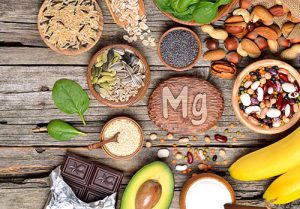
Image By craevschii
Magnesium and vitamin D are two partners working within the body. Many people in the U.S. find themselves low in vitamin D, particularly during the winter months. An interesting and often overlooked aspect of this is magnesium. Vitamin D is actually activated by magnesium and the lack of sufficient magnesium can sometimes be the real culprit behind low vitamin D levels. Nutritionists usually recommend supplementing with both together.
A Look at Magnesium
Nuts, leafy green vegetables, avocado, salmon, and dark chocolate are a few of the foods known to be sources of magnesium. Magnesium sulfate (Epson salt) commonly used in baths, is a source that can be absorbed through the skin. A staggering 80% of people in the U.S. are obtaining enough magnesium on a daily basis. It is important to note the difference between having optimized levels and not being deficient. There are numerous reasons that someone could have low levels. Drinking alcohol, taking certain prescriptions, eating a diet high in processed or sugary foods, and not eating magnesium-rich foods are all possible contributing factors to not having enough magnesium. If you are unable to get enough naturally, supplementation may be warranted.
What is Vitamin D?
You may have been under the assumption that vitamin D is a vitamin. The name is rather misleading considering that vitamin D is in fact a fat-soluble hormone. The production of this hormone is triggered by exposure to sunlight. Vitamin D is a critical hormone in the body as it has a role in maintaining the health of the immune system, cardiovascular system, and skeletal system. It is also an important factor in cancer prevention.
Team Effort
Magnesium and vitamin D have a close partnership. Vitamin D needs magnesium in order to be utilized within the body. Interestingly, magnesium is used to both make vitamin D available in the body and to lower it when levels become high. Without the presence of magnesium, vitamin D it’s stored away in the body’s tissues instead of being used. This explains why supplementing vitamin D alone may not be the right approach to correcting a vitamin D deficiency.
Natural Sources
Before supplementing, you may consider first working on optimizing your natural sources of magnesium. Does your diet contain too many processed and sugary foods? Start adding more whole foods into your diet. Do you lack foods rich in magnesium? Start incorporating more magnesium-rich foods. Enjoying regular baths with magnesium sulfate (Epson Salt) or using a magnesium spray may be other ways for you to up your levels. Before starting any supplementations, be sure to consult with your doctor about the right amounts for you.
Have Health Insurance Questions?
We hope that this information on magnesium and vitamin D deficiency is helpful for you.
Insurance is oftentimes overwhelming and we want to shed light on the industry by answering your questions. Comment below and your question may be the topic of our next post!
If you liked this article, share it with your friends!
Empower Brokerage wants to help you find the insurance coverage you need and how to save money getting it. Stay on top of your health and give us a call at (844) 410-1320.
Get affordable health insurance quotes by clicking here.
See our other websites:

